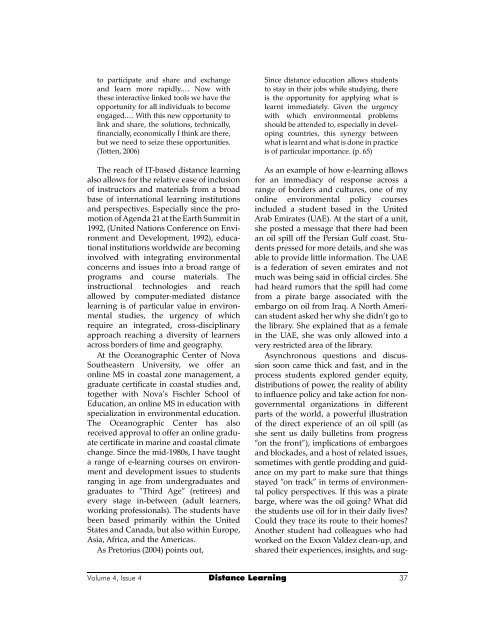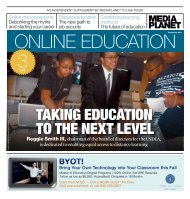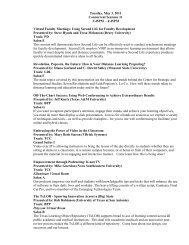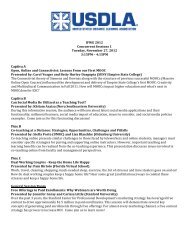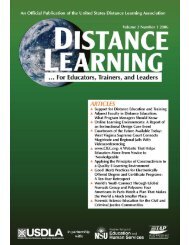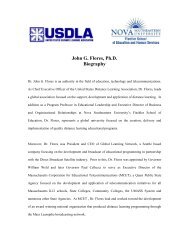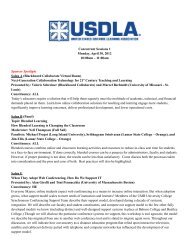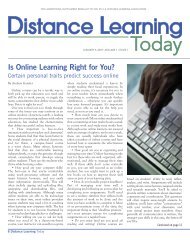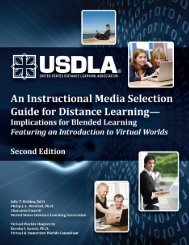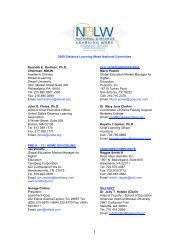United States Distance Learning Association
United States Distance Learning Association
United States Distance Learning Association
- No tags were found...
You also want an ePaper? Increase the reach of your titles
YUMPU automatically turns print PDFs into web optimized ePapers that Google loves.
to participate and share and exchange<br />
and learn more rapidly.… Now with<br />
these interactive linked tools we have the<br />
opportunity for all individuals to become<br />
engaged.… With this new opportunity to<br />
link and share, the solutions, technically,<br />
financially, economically I think are there,<br />
but we need to seize these opportunities.<br />
(Totten, 2006)<br />
The reach of IT-based distance learning<br />
also allows for the relative ease of inclusion<br />
of instructors and materials from a broad<br />
base of international learning institutions<br />
and perspectives. Especially since the promotion<br />
of Agenda 21 at the Earth Summit in<br />
1992, (<strong>United</strong> Nations Conference on Environment<br />
and Development, 1992), educational<br />
institutions worldwide are becoming<br />
involved with integrating environmental<br />
concerns and issues into a broad range of<br />
programs and course materials. The<br />
instructional technologies and reach<br />
allowed by computer-mediated distance<br />
learning is of particular value in environmental<br />
studies, the urgency of which<br />
require an integrated, cross-disciplinary<br />
approach reaching a diversity of learners<br />
across borders of time and geography.<br />
At the Oceanographic Center of Nova<br />
Southeastern University, we offer an<br />
online MS in coastal zone management, a<br />
graduate certificate in coastal studies and,<br />
together with Nova’s Fischler School of<br />
Education, an online MS in education with<br />
specialization in environmental education.<br />
The Oceanographic Center has also<br />
received approval to offer an online graduate<br />
certificate in marine and coastal climate<br />
change. Since the mid-1980s, I have taught<br />
a range of e-learning courses on environment<br />
and development issues to students<br />
ranging in age from undergraduates and<br />
graduates to “Third Age” (retirees) and<br />
every stage in-between (adult learners,<br />
working professionals). The students have<br />
been based primarily within the <strong>United</strong><br />
<strong>States</strong> and Canada, but also within Europe,<br />
Asia, Africa, and the Americas.<br />
As Pretorius (2004) points out,<br />
Since distance education allows students<br />
to stay in their jobs while studying, there<br />
is the opportunity for applying what is<br />
learnt immediately. Given the urgency<br />
with which environmental problems<br />
should be attended to, especially in developing<br />
countries, this synergy between<br />
what is learnt and what is done in practice<br />
is of particular importance. (p. 65)<br />
As an example of how e-learning allows<br />
for an immediacy of response across a<br />
range of borders and cultures, one of my<br />
online environmental policy courses<br />
included a student based in the <strong>United</strong><br />
Arab Emirates (UAE). At the start of a unit,<br />
she posted a message that there had been<br />
an oil spill off the Persian Gulf coast. Students<br />
pressed for more details, and she was<br />
able to provide little information. The UAE<br />
is a federation of seven emirates and not<br />
much was being said in official circles. She<br />
had heard rumors that the spill had come<br />
from a pirate barge associated with the<br />
embargo on oil from Iraq. A North American<br />
student asked her why she didn’t go to<br />
the library. She explained that as a female<br />
in the UAE, she was only allowed into a<br />
very restricted area of the library.<br />
Asynchronous questions and discussion<br />
soon came thick and fast, and in the<br />
process students explored gender equity,<br />
distributions of power, the reality of ability<br />
to influence policy and take action for nongovernmental<br />
organizations in different<br />
parts of the world, a powerful illustration<br />
of the direct experience of an oil spill (as<br />
she sent us daily bulletins from progress<br />
“on the front”), implications of embargoes<br />
and blockades, and a host of related issues,<br />
sometimes with gentle prodding and guidance<br />
on my part to make sure that things<br />
stayed “on track” in terms of environmental<br />
policy perspectives. If this was a pirate<br />
barge, where was the oil going What did<br />
the students use oil for in their daily lives<br />
Could they trace its route to their homes<br />
Another student had colleagues who had<br />
worked on the Exxon Valdez clean-up, and<br />
shared their experiences, insights, and sug-<br />
Volume 4, Issue 4 <strong>Distance</strong> <strong>Learning</strong> 37


